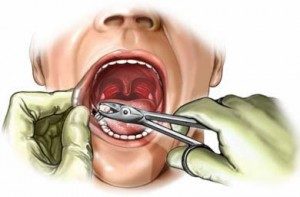COVID - 19 | Message from V Care Dental - Read More
Tooth Extraction Dentist
At V Care Dental, we’re proud to offer professional tooth removal and replacement solutions when you need a tooth extracted from the mouth. Your dentist will examine your tooth and explain the reasons why your tooth needs to be extracted. An x-ray will be taken to help plan the best way to remove the tooth and to see if an abscess is present.
If an abscess is present, your tooth extraction dentist will give you a course of antibiotics before your tooth is removed. Your dentist will also ask you about your medical history. You must list every medication you are taking even if you have purchased it from over the counter, as some medications can complicate an extraction.
Common Reasons for Tooth Extraction
A tooth extraction and tooth replacement procedure is performed for a wide variety of reasons, some of which include:
- Tooth decay – If the decay is severely advanced and the nerves and blood vessels in the tooth have been infected, and are unsuitable for root canal treatment.
- Impacted wisdom teeth – Sometimes our mouths are simply not big enough to accommodate these teeth. The teeth become impacted (stuck), which can cause infection and pain.
- Orthodontics (braces) – Teeth can erupt in many different positions, and if this happens you may have to have teeth extracted so your other teeth can be brought into line.
- Periodontal disease – Bacterial infection under the gum damages the tissue which connects the tooth to the gum. As the disease progresses, the bone anchoring the tooth to the jaw begins to dissolve, resulting in the tooth becoming loose.
- Teeth that have been damaged by trauma.
- Certain medical conditions may require teeth to be extracted.
Our Tooth Replacement Procedure
There are two types of methods used for tooth removal.
A simple extraction is performed when the tooth can easily be seen in the mouth. The dentist will give you a local anaesthetic to numb the area around the tooth. When the anaesthetic has taken affect and the area around the tooth is numb, the dentist will grasp the tooth using a pair of forceps. You will feel pressure but NO pain. The dentist will move the forceps back and forth to loosen the tooth in order to extract it.
Surgical extractions are carried out on teeth which cannot be seen in the mouth but are present below the gum, partially showing through the gum, or broken off at gum level. A local anaesthetic will be administered to numb the area before a small incision is made in the gum. The gum is pulled back to expose the whole of the tooth or the root. The dentist then uses the same procedure as a simple extraction to remove the tooth. In some cases, the tooth or root may have to be cut into pieces to be removed.
When the tooth has been removed, a swab will be placed at the extraction site and you will be asked to bite on this until the bleeding has stopped and a blood clot has formed.
Tell your tooth extraction dentist if you are anxious about the procedure, as sedation is available.
Tooth Extraction Aftercare
We offer useful and reliable tooth extraction aftercare advice for patients following the procedure. We highly recommend not disturbing the blood clot that forms in the socket, as this assists the healing process. If the socket does start bleeding, we suggest placing a clean tissue over the extraction site and applying pressure by biting down. The bleeding should stop naturally within a few minutes. If bleeding persists, please contact your dentist for further advice.
Your mouth will still be numb for an hour or so after the local anaesthetic. Please take care not to bite your cheek or tongue or burn your mouth when drinking hot liquids. Avoid smoking and alcohol for 24 hours, as these can have an effect on the healing process. You may be in discomfort after the anaesthetic has worn off. Household painkillers are suitable if you follow instructions, but do NOT take Aspirin, as this may cause the socket to bleed.
Contact us today for more details about our tooth extraction and tooth replacement procedure. Our tooth extraction dentist is also happy to discuss the tooth extraction cost with you.
“Any surgical or invasive procedure carries risks. Before proceeding, you should seek a second opinion from an appropriately qualified health practitioner.”

